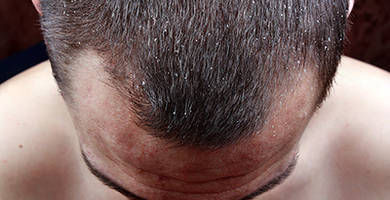Is hair transplant allowed in Islam? Is it haram or halal?
By Prof. Dr. Soner Tatlidede 2019-08-28

Is hair transplant allowed in Islam? Hair transplant, is haram or halal? When thinking of getting this kind of surgery, many Muslim people wonder about the rulings in Islam about hair treatments, and whether it is permissible or prohibited in terms of religion.
So, how is considered hair transplant in Islam? Before answering this question, we need to know how the hair transplant procedure is done; because it wouldn´t be right to judge anything before knowing it. We at Clinicana are proud of having the best hair transplant hospital for FUE in Turkey; so thanks to our experience and skilled medical staff, we can tell you about all the details surrounding this treatment.
How is the hair transplant done?
Hair transplant is performed transferring hair follicles from one area to another in the head of the same person. To carry out this procedure, hair follicles are extracted from the back of the head of the patients; then the implantation area is prepared by making a tentative map for implantation grading, and then follicles implantation spots are specified. Later, small holes of 1 mm diameter are made, and those follicles are implanted in those holes.
This is the most modern technique used nowadays, and it´s called FUE (Follicular Unit Extraction). The implanted hair often falls in the first three months, but the follicles remain unchanged; therefore, it is advised not to shave your hair during the six months following the procedure. After this period is over, the hair cycle is completed and you can shave it or proceed with another transplant procedure.
But before talking about hair transplant and Islam rulings, let us talk a little about hair extensions, which are prohibited in Islam and that may be mistaken for hair transplant, despite being totally different concepts.
What are hair extensions?
Hair extensions imply attaching the original hair of a person with another additional hair to make it longer and change its appearance. Hair extensions attachment was popular and known at the time of Prophet Muhammad (PBUH).
It's narrated in a hadith that a woman came to the prophet and told him that her daughter was going to get married, but she had a hair problem and she wanted to look beautiful (may be because her hair was too short). The woman asked the prophet whether she could make her daughter's hair longer by attaching an extension, but the Prophet told her that it was forbidden.
"Allah has cursed the woman who adds hair extensions, and the one who ask them to be added”, he said to the woman, implying both the one that has asked for a hair extension and the one that wishes to do it. Therefore, hair extensions are prohibited in Islam (haram).
What are the differences between hair extensions and a hair transplant?
The most prominent differences between the two include:
- In hair extensions attachment, the thing attached to the original hair is not something original from it; this extension is either natural hair or something else (i.e., synthetic hair). On the contrary, in a hair transplant the added hair is from the original hair itself with its follicles, and it is all about hair being transferred from the donor area to the headline or the area to be implanted.
- The hair extension attachment is made from another person (or thing), while in a hair transplant the implanted hair is from the same person.
- The extension (hair or something else) is attached and tied to the original hair, and therefore it's called attached extension. Hair transplant is different, as the hair is implanted in the scalp - or in the area to be implanted – directly, and it is not connected to the existing hair, as the transplant is often in a bald or almost bald area.
- The purpose of hair extension attachment is adding more density to the original hair, making it longer and making it look as if it was thick; however the extension doesn't grow and doesn't make the hair longer or thicker for real. On the contrary, in a hair transplant the hair emerging from the implanted follicles grows, becomes thicker and can be cut and shaved. Hair transplant makes it look as it was before, and it´s not just a false implication of hair density like in a hair extension attachment.
- In a hair extension the extended hair itself is the intended thing, as it will appear on the head; whereas in a hair transplant the intended thing are hair follicles, which are extracted from the same person; the implanted hair will fall in a few weeks, and after three or four months new hair -that will stay on the head- will grow.
- Hair extension attachment is often used with existing hair, so the purpose is to pretend that the hair is long and beautiful; whereas hair transplant is performed on a bald person or when there's no hair in some areas of the body (or might be performed when the hair is thin and spacing), meaning that hair extension attachment is deception and delusion, but implanting hair is a treatment.
Therefore, it's clear that hair transplant is completely different from hair extensions attachment in terms of meaning and purpose.
Rulings on hair transplant permission
So, is a hair transplant haram? Based on the above-mentioned information, we would like to review some of the scholars' sayings on this subject to determine if a hair transplant is halal or not:
Shaykh Muhammad ibn ‘Uthaymeen (may his soul rest in peace) was asked:
Hair transplant is an operation to be done to a person who suffer from baldness, and it is about taking hair from the back side of the head which is the (the donor area) and transplant them in the baldness area. Is that permissible?
Yes, that is allowable because it is an operation that is done to repair the damage that happens to the head scalp, so it is not a changing in what Allah has created. Hair transplant is not considered a cosmetic surgery to adjust Allah creation; it is just considered as a therapy we use to treat this baldness.
In fact, it is just a procedure to restore the hair that has been fallen and try to correct this fault. There is a popular anecdote of three persons; one of them was suffering from baldness and he had always had a dream that Allah would retrieve his hair again; so, an angel touched him and Allah returned his hair and gave him what he had always dreamed of. Fatawa ‘Ulama’ al-Balad al-Haraam, p. 1185.
In the book "Dirasat Fiqhiyyah fi Qadaya Tibbiyyah; Mu'asirah 2/549", under the subject of rulings on cosmetic surgery, Dr. Muhammad Uthman Shubair said:
"Surgical hair treatment by having head hair transplantation procedure, so that it grows, is permissible, as it doesn't involve deception but rather treatment to restore the perfect creation in which man was created". Dr. Mahmoud Sartawi: Ruling of Dissection and Cosmetic Surgery in Islamic Law – Dirasat Magazine – third issue 1984. p. 149.
Answering the question (about if are hair transplants haram), Islamic Fiqh Academy gave the following ruling:
“Islamic rules permit the necessary and needed plastic surgery intended to:
- Restore the shape of body parts to the condition in which man was created, as Allah says: We have certainly created man in the best of stature (Surah At-Tin: 4).
- Revive regular tasks.
- Conceal the congenital defects like: cleft lip, extremely diverted nose, birthmarks, extra fingers and teeth and adherence of fingers, if such defects cause effective material or moral damage.
- Conceal the defects resulting from burns, accidents, diseases and the like. For example, desmoplastic, reconstructing the breast completely if there was a mastectomy, or partially if it is big enough or small enough to cause a medical condition, and hair transplant for women who suffer from hair loss."
Hair transplant is included in the permitted treatment section, because it is cultivated in the original place. There is no constraint to have a hair transplant as treatment when man loses his hair. This is not about altering the creation of Allah, but rather it is concealing the defect and treating diseases.
So, is hair transplant halal?
Therefore, we can say: according to Islamic rules there's no constraint in transplanting scalp hair, restoring the lost hair with a medical method in a way that removes the defect, cultivates the hair and restores it to the original condition.
Where the hair grows back after the surgery and gets longer by itself, it has nothing to do with hair extensions attachment, but rather it's considered a treatment, which is permitted and permissible.
The Tale of Three Israelites
This ruling is supported by what was said by Al-Sahihain in The tale of three Israelites, where the Prophet (PBUH) said: "Allah willed to test three Israelis who were a leper, a blind man and a bald-headed man. So, he sent them a mercy angel. The angel asked the blind man about ‘what thing would you like the most?' He said I’d like to have a good hair and I hope one day to be recovered of this disease, for the people who feel dissonance for me. And he was healed.
Related by Bukhari in "Ahadith Al-Anbea", hadith of leper, a blind man and a bald-headed israelite man (3464); and Muslim in "Al-Zuhd wa Al-Raqaiq" (2964), from the hadith of Abu Huraira, may Allah bless him.
This hadith indicates that concealing the defect by cultivating hair is permitted, as if it was prohibited the angel wouldn't do it; also, if it was permitted in their religious laws and prohibited in Islamic law, the Prophet (PBUH) wouldn't acknowledge it at the time of clarification (to delay clarification (on matters) beyond reasonable time is not permissible).
What the Prophet (PBUH) said about cosmetic surgery
This ruling is also supported with what was narrated in Sunan Abi Dawud: "AbdurRahman ibn Tarafah said that his grandfather Arfajah ibn As'ad who had his nose cut off at the battle of al-Kilab got a silver nose, but it developed a stench; so the Prophet (PBUH) ordered him to get a gold nose." This hadith proves that treatment is permissible, and it is the same ruling for a hair transplant.
In summary, we can clearly say about hair transplant surgery in Islam that, according to the most important Islamic scholars and to all hadiths about the issue, hair transplant is allowed in Islam, and that contrary to the prohibited hair extensions, hair treatments are not haram, but halal.









